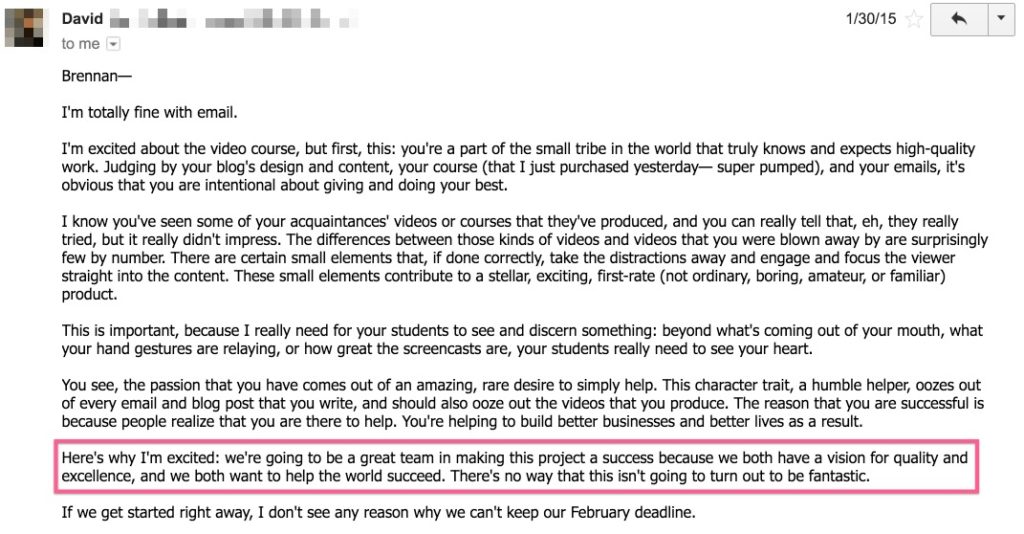A few years ago, I was prepping to release my most ambitious project to date: Double Your Freelancing Clients (which is now Sell Yourself Online: The Blueprint)
As a solo entrepreneur, I was used to doing most things on my own. I code my own site, write my own content, do most of my own designs, set up my own marketing automation, support customers, and more. (Majoring in graphic design, then switching to computer science, and, finally, the Classics has really paid off… I guess?!)
But video was something I knew little about.
And like with most things I know little about, I immediately dove in and read up and watched everything I could. I learned about Adobe Premiere, Final Cut Pro, cameras, lenses, and more.
Fortunately, I quickly realized the mistake I was making.
I tell people all the time to delegate out work they either don’t have the time to do, aren’t uniquely qualified to do, or just don’t know. “Spend a lot of time researching and experimenting” isn’t a viable strategy at this point in my business.
So I started reaching out to local videographers.
I met with people, most of whom did freelance filming and editing outside of their day job. Meetings took place at coffee shops, where I led the discussion and the freelancer I was speaking with would ask few questions, nod often, and never once really asked my why I cared about filming five hours of video.
The local who I thought had the best chance of getting this done quoted me $18 an hour, and figured the total budget would be around $1,500.
I thought he was joking.
For the last decade, I’d been doing web programming using Ruby. The going rate of a Ruby developer is often over $100 an hour, and it has been since I started. $18 an hour seemed abnormally low-ball.
Was something wrong with this guy? I actually thought this. I legitimately believed he was either 1) completely new at this, and was offering me a rate that would ensure he won the project or 2) wasn’t serious about the project.
Neither scenario did it for me.
I needed to make sure that this went off without a hitch. I was planning a big launch sequence and knew that I’d be bringing in multiple six-figures of revenue. If this freelancer screws up the project, I’m back at square one.
I had more at risk than just money. I had my time and reputation on the line.
I then reached out to someone from my list, a customer of Double Your Freelancing Rate, named David.
When he originally got word that I was working on a video course, he said he’d be happy to help. But he lived a few states away, and the idea of hiring someone to film you seemed like something you should do with a local. I initially passed.
I reached back out to David. Something just didn’t feel right.
The freelancer I had been speaking with was having a hard time staying in touch, and even though I knew he had a full-time job, I was starting to feel a bit iffy about the prospect of working with him.
We started chatting again, and here’s the email that did it for me:

What set David apart was that he wasn’t just concerned with his craft.
He wasn’t trying to get me to hire him to film and edit my video course. Instead, he was telling me that his chief concern was in helping me to build a better product.
David wasn’t afraid to let me know that he would cut a recording and tell me that I was losing him by going off on some weird tangent.
Nor was he afraid to ask me about who the target customer was of this course, what preconceptions they had about sales and marketing, and what I ultimately wanted them to get from watching my course.
He knew that I was more interested in creating better customers than I was creating better video courses.
By looking at his craft as being a tool that could get me from where I was now (having a list of people, many of whom had zero or half-baked sales funnels) to where I wanted to be.
A great video course was just a means to an end, and David knew that. I knew that.
But everyone else I spoke with didn’t, and were mostly concerned with the technical details of filming and editing.
This is why I paid David 15x more than everyone else wanted.
David was offering me a better product.
He wanted me to create a better, more impactful video course.
Think about the work you do, and how you typically present yourself to clients. Do you think of yourself as a designer of designs, a programmer of machines, a writer of words, or something else?
Do you sometimes forget to step back and look at the big picture, and realize that your value is more than the going rate for freelancers like you — if you would only stop focusing so much on what it is you do and start looking at what effect you have?
I want to pay editors who help me sell more books.
I want to pay designers who help make my brand look more trustworthy and approachable, thus driving more sales.
I want to pay coders who understand that what I want is a better, and more foolproof, user experience.
I want to pay coaches and consultants who help me figure out what needs to happen to get my business to the next level.
And, speaking as a client, I’m not alone. The reason you might not feel that you’re worth charging more is because you aren’t thinking about offering a better product.